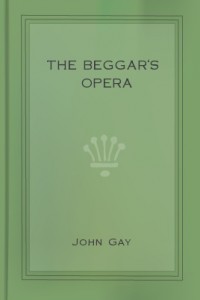 The Beggar’s Opera, or at least the edition I recieved for review, and I, have an unusual history. Ever since I received this book in the mail, one thing after another manifested to distract me from my mission. Every time I sat down to write the review of The Beggar’s Opera, it vanished, only to turn up later, after the inclination and time to write had passed. I began to wonder if perhaps my cats had entered into a conspiracy to keep me from saying anything about it, or whether the book itself was sentient and highly mobile. Looking for The Beggar’s Opera became an exercise in discovery, as the increasingly frequent attempts to clean up my office as I searched high and low turned up dozens of other books and magazines I haven’t had the chance to read yet. It was like a treasure hunt, where instead of one prize, I was finding twenty.
The Beggar’s Opera, or at least the edition I recieved for review, and I, have an unusual history. Ever since I received this book in the mail, one thing after another manifested to distract me from my mission. Every time I sat down to write the review of The Beggar’s Opera, it vanished, only to turn up later, after the inclination and time to write had passed. I began to wonder if perhaps my cats had entered into a conspiracy to keep me from saying anything about it, or whether the book itself was sentient and highly mobile. Looking for The Beggar’s Opera became an exercise in discovery, as the increasingly frequent attempts to clean up my office as I searched high and low turned up dozens of other books and magazines I haven’t had the chance to read yet. It was like a treasure hunt, where instead of one prize, I was finding twenty.
How does this relate to John Gay’s masterpiece of satire and social commentary? Because among the Stewarts Draft Cola bottles (three, unopened), The Complete Monty Python’s Flying Circus (book form, two volumes) and my Jay and Silent Bob action figures, I found treasures. My search turned up much more than I was expecting to find. And that’s what you’ll get if you read The Beggar’s Opera — a lot more than you thought you would.
First put on in 1728, The Beggar’s Opera set the stage for centuries to come, revitalizing the comedy genre, and recreating the musical comedy genre in a new light. John Gay’s work borrows from a variety of sources, starting life in the concept of “Quaker pastorals” or “a Newgate pastoral, naming the whores and thieves there.” Posing in various forms as social commentary, a satire on Italian opera, a ballad opera, and a musical comedy, there’s no doubt that The Beggar’s Opera has inspired playwrights and composers ever since, and its popularity has never been in doubt. [Editor’s note: In 1928 Kurt Weill and Bertold Brecht transformed John Gay’s The Beggar’s Opera into a scathing critique of German moral decadence–The Threepenny Opera — which was also a not so subtle political satire on Hitler’s rise to power.]
Boiled down to its simplest form, The Beggar’s Opera is a story about heroes, villains,whores, rogues, love, confusion, sacrifices, betrayal, redemption, and humor. Seventeen scenes in 3 acts that span the course of one day in London, revolving around a highwayman, the women who love him, their respective families (one family is into crime, the other into law), and assorted extras, all set to song, dance, and the occasional musical accompaniment. Is it any good? I enjoyed reading The Beggar’s Opera. I really did. Would it be better seen on stage? Undoubtedly so. The value of this book lies not in the play, but in what we get besides the play.
For starters, there’s a history and biography of John Gay. There’s a detailed analysis, plot summary, and history of the play itself, going into many of the background details about how The Beggar’s Opera came to be. Finally, there’s a section on staging and performance, historical and otherwise. This is the sort of book best used for reference, educational purposes, or general interest. To properly understand the play, go see it live.
The book is recommended, but let me note that this edition I reviewed was published in 1962, and is most likely out of print or difficult to obtain. You may have to do some hunting to find a Beggar’s Opera resource that’s equivalent. But if you can, or if you can find a more recent edition of this same book, by all means, look for it. It’s a worthy addition to anyone’s library, especially if you like musical theater, or theater in general.
